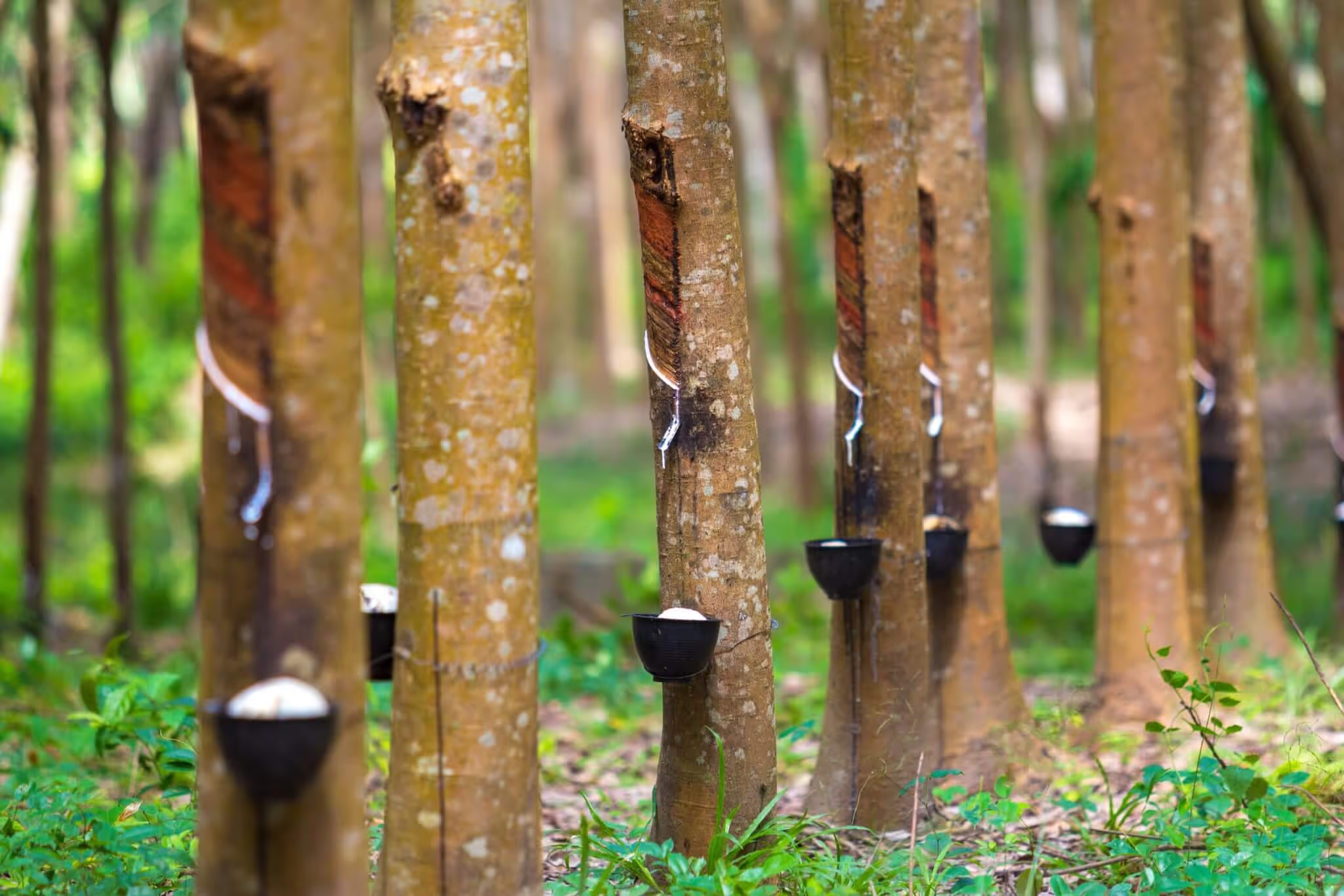Last month our Head of Market Development, Anna Roberts, spoke to Asia’s leading industry publication, Plastics and Rubber Asia, about the EU Deforestation Regulation (EUDR) and what this means for producer countries.
She explained that new technologies like Distributed Ledger Technology (DLT) or more specifically our Interu solution, have the ability to completely transform the way business, governments and societies operate due to the ability to build solutions using the technology’s decentralised, immutable system that puts trust and accountability at its core.
For example, when it comes to complex supply chains, not only can the use of this technology improve efficiencies and help build stronger bonds of trust between participants and consumers, but it can also help importers meet existing and new regulations (like the EU Deforestation Regulation), help organisations towards their net zero targets and open up a whole host of business opportunities due to the increasing demand for traceability.
But let’s first start at the beginning
At iov42, we have built a technology using DLT that allows us to embed trust in countless value exchanges worldwide, so for every exchange an organisation makes, our technology will allow them to answer these five key questions:
- Who am I transacting with?
- Do I trust what we’re exchanging?
- Can I be sure the value exchange has happened digitally?
- Where is the proof of that value exchange? How do I know it has happened in accordance with regulation?
We do this through our dynamic use of digital identities, assets, claims and endorsements. Every identity, asset or claim needs to be endorsed by a reputable third party (or parties) which is then stored and attached to that data point, on the system.
Once verified, relevant parties are able to conduct their own due diligence on a product’s history. For example, in the rubber space, all the way from the plantation, to processing, shipping, customs, manufacturing and finally to the customer.
Using this kind of technology is innovative not only because it increases the level of accountability of supply chain processes, but also due to its ability to join up science-based testing and certification from third party endorsers in one trusted system. This allows companies to verify the true authenticity and sustainability of a product.
Misplaced fears around commercially sensitive information
So what is holding organisations back in adopting DLT? Our 2022 timber traceability report found that 56% of respondents had misplaced fears that using traceability technology, such as DLT, could lead to the loss of trade secrets.
However, iov42’s solution, Interu, has a set of permissions that the users can either grant or restrict. For example, the shipment data only becomes available to the importer once the exporter has established a connection and has explicitly shared the shipment data with them.
So whilst immutable, no trade secrets are being shared beyond those that need the information. It is also possible to blank out information from an endorsed document, so not every detail is shared along the supply chain when it is not needed – this could be pricing details or addresses, etc. You can read more about our privacy approach here.
How can this technology support in helping importers meet the EU Deforestation Regulation?
From 1st January 2025, large organisations will be legally obliged to ensure that any produce being imported into or exported out of the EU is not contributing towards deforestation. This means ensuring they have traceability beyond their immediate supplier and back to source – whether that is in Malaysia, Indonesia, USA, Brazil or other source countries.
Interu supports organisations who trade commodities affected by regulations like the EUDR, which allows its users to benefit from:
- Trusted and secure storage of the required due diligence information, including data being time stamped and tamper-proof
- Auditable digital records about all stakeholders within a specific supply chain and the associated products
- Easy and secure access to relevant information for certifiers, authorities, and customers
- Interlinked information which is easy to navigate without searching through emails and paperwork
- Shipment information is shared with buyers, allowing them to trace the origin of a product and perform due diligence / risk assessment
- Easily demonstrate compliance at the point of receiving shipments
The decentralised, immutable ledger that records and verifies transactions helps importers and exporters with traceability and transparency across the entire supply network. Each step from harvesting and processing to distribution can be recorded on this purpose built technology and provide a comprehensive history of the products’ origin and movement. It will then be easier to identify potential risks or illegal activity due to better visibility of the chain of custody.
Interu and reputable third party verifiers help when it comes to facilitating the authentication and verification of products. This is by assigning unique identifiers to each user and asset and then recording them on the platform – creating tamper-proof records. By linking data with products, and having transparency around which stakeholders’ digital identities were involved, enhanced levels of integrity and accountability are achieved across the supply chain.
Users can store due diligence related data including certificates, compliance records, life cycle analysis and risk assessments, in a secure way that is easily accessible for inspections, compliance checks and audits. Once again, this will promote transparency and accountability and make time consuming processes more efficient.
Interu’s use of iov42’s technology ensures data integrity through features such as immutability to prevent changes and cryptography to ensure that data is protected from unauthorised access. Public/private key cryptography and a customisable permission model allow participants to securely interact with the DLT network, ensuring that only authorised users can perform transactions and access the data.
Once information is recorded on the DLT it cannot be erased or changed. Some people are worried that the immutability means that it is not possible to make any corrections. However, any issues can be resolved by making amendments, it’s just that both the original version and the amended version will be stored on the DLT, providing an auditable history of changes. By doing this, the integrity of the due diligence related data is ensured, data quality increases, and the risk of falsified documents or fraudulent claims will be mitigated.
All of this enhances the confidence and trust in the importers’ and exporters’ due diligence efforts, both for external stakeholders and within the supply chain itself.
Challenges and questions around some of the finer details of the regulation
Understandably, importers have a lot of questions and there are still many clarifications needed which we, along with our partners, are looking to guide importers on. However, one of the things we do know is that they will require a certain amount of information from their suppliers as part of their due diligence statement – including geolocation data.
As a result, we are seeing many exporters in producer nations wanting to also get ahead of the regulation so that they can support and provide the necessary information to their customers further down the supply chain. However, this isn’t always easy. This is where cooperatives are able to support in the gathering of this information given that no guidance has been given and often smallholders don’t have the necessary tools to extract and share this detail.
The burden of regulatory compliance is real, and our goal is to make work easier and less time consuming for those needing to meet these new requirements. That is why our technology has been designed to work with, rather than replace, existing systems. Integration and interoperability between our system and client / supplier systems will be critical for successful adoption.
*Not in the original interview* We also reached out to our partners in Indonesia and spoke to Dr Rudy P. Tobing at Fortex Strategic Advisory to get his take on how the EUDR and increase in traceability will impact the Indonesian economy. He said:
“The potential benefits for Indonesian organisations from increased traceability is significant. Especially due to the increased market access and resulting revenue from the EU and UK importers. This is because these buyers want to work with producer countries who can not only provide quality products, but also the necessary information to help them meet regulations like the EU deforestation regulation (EUDR).
“That being said, it is important to note that there is still a lot of uncertainty about the future of the EUDR. So to encourage Indonesian exporters to support these new initiatives, it is vital that products are treated with a premium price to avoid regulations like this having a negative impact on the Indonesian economy, as well as making sure producer countries are not at a disadvantage during trade negotiations.”
The effect of regulations on sourcing and supply chains
EU importers and exporters will need to have much more of a grip on every stage of the supply chain and component product part. This demands better traceability between steps in supply chains and a need for greater transparency. This adds additional considerations and burdens to sourcing and procurement teams, and will require upstream providers to share more information (for instance, about the geolocation of any harvest points).
Rubber suppliers (for example) who are willing to and easily able to share this information will likely be favoured by EU importers. If EU operators are unable to perform due diligence at the level required on a supplier, they should not purchase from that supplier.
This may mean a few things:
- Global supply patterns change, with less transparent supply chains supplying to markets that don’t demand the same level of accountability and scrutiny.
- Prices may go up for the reassurance that products are deforestation free.
- Alternative products may be investigated to replace those covered by the legislation.
- Sourcing may happen closer to home – e.g., investment in local plantations of alternative products.
These could, of course, have negative consequences for smallholders unable to satisfy the demands, which is one of the main criticisms of the regulation.
Working with some great organisations in SouthEast Asia we have seen digitising processes can help elevate data quality and accountability. This has resulted in positive reception from European buyers and even discussions about a willingness to pay a premium.
Ultimately our aim is to make work easier for those committed to legal and sustainable trade and production. If we can use technologies to automate processes (e.g., certificate checks, mass balance calculations), enhance security (giving users greater controls over their own data and who it is shared with) and improve visibility (traceability along supply chains), then this will build trust. And trust will build business relationships.
You can read the full interview in Plastics and Rubber Journal here.





